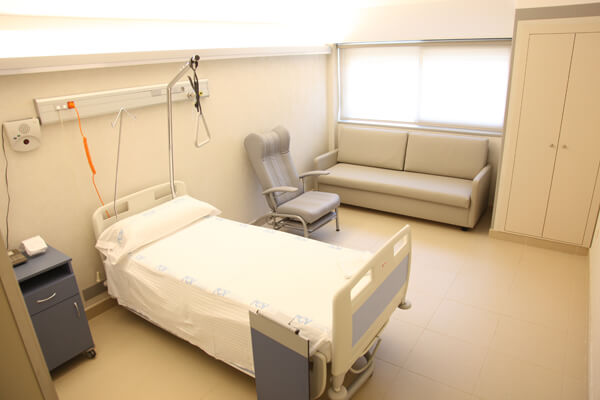It has a medical team, a nursing service, a social worker, physiotherapists, an occupational therapist, a psychologist and a speech therapist who act in a coordinated manner, to guarantee the continuity of the cures dispensed, and to ensure reintegration into the community. They carry out the Individual Attention Programs weekly.
The Doctor knows the health status of people and their levels of dependency at the time of admission. Prescribes specific treatments and indicates the measures to be taken into account according to individual needs.
Carry out the physiotherapy assessment at the time of admission. Identify problems, establish objectives, specify preventive, maintenance and therapeutic treatment, inform and involve the user of the objectives to be achieved. Establish a commitment with the patient and family to provide treatment from a global perspective.
Carry out tasks for the recovery, maintenance and development of the necessary capacities to carry out activities of daily life that allow, where appropriate, their reintegration into the community. Define the occupational therapy intervention program for the user, making an assessment, planning, execution and evaluation of the intervention plan.
Inform, guide and advise the user and the family of the intervention program.
Train, reeducate and establish intervention guidelines in occupational areas to prevent and improve occupational dysfunctions.
Mental capacities are assessed, and, where appropriate, possible alterations are treated. Carry out the psychological evaluation of the person in his emotional, cognitive and psychopathological side.
Elaborate the differential diagnosis, carry out the treatment, intervention and prevention in the emotional, relational area, from the individual point of view as well as from the group.
Assessments and sessions are carried out for the treatment of speech, language and communication disorders.
The social intervention will be aimed at increasing the quality of life of the patient along with that of the family involved in the process, providing the necessary care and providing appropriate social support in each situation.
Actions will be carried out, depending on the area where the intervention is directed.

Economic and administrative area
Adaptation of personal and/or family resources to the needs, advice and information on social resources, legal and basic legal aspects.
Housing Related Area
Together with the occupational therapist and the physiotherapist (removal of architectural barriers…) or subsidies from official bodies to adapt the home to the new physical conditions of the patient (wheelchair…).
Social relations area
With the aim of avoiding the social disengagement of the sick and elderly person. It is essential to intervene in the line of maintaining and promoting integration from their social environment, taking into account the individual situation of each one.
Area related to the degree of dependency
The purpose is to increase the quality of life of the patient and avoid premature institutionalization of the patient, if his health status allows it, having a family, as provider of the patient’s cure, to guide and offer the necessary support to avoid the risk of stress and overload, improving the social situation and improving the maintenance of patient care.
Process of physical and/or mental incapacitation
Physical disability: information, guidance and management of orthoprosthetic services. Together with the professionals in the rehabilitation area, articulate guidance and training pathways for families, so that they collaborate and participate in the patient’s rehabilitation.
Psychic disability: Together with the team psychologist, inform the family about the processes of mental deterioration and guide and train the family, so that it is capable of maintaining the patient’s cognitive functioning, as well as preventing family claudication.
Coordination plan with other social services
From the patient’s admission, we contact the rest of the services that work or will work with him on discharge (ABS, SSAP, Day Center…), to agree on social intervention, which will be joint in all cases of discharge at home or to other internment services.
Medical director: Isaac Contel
Assistance Director: Jose Luís Guillen
Doctor: Miguel Del Río
Visiting hours: arranged hours
Visiting hours: arranged hours
Visiting hours: arranged hours
Visiting hours: arranged hours
Visiting hours: arranged hours
Visiting hours: arranged hours
Visiting hours: arranged hours
Visiting hours: arranged hours
POLICLÍNICA COMARCAL DEL VENDRELL is an integrated and versatile health center where personalized care and quality of care are our raison d’être.
